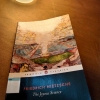"You matter because you are you, and you matter to the end of your life." - Dame Cicely Saunders
The above statement summarizes what i think a doctor that would give the best care for me would say, if i ever got cancer. It shows that the doctor would consider my view and choices, maybe would be willing to adjust the therapy to my best interest, and that he actually care for me and not only my disease. Because i hope, i would matter more than my cancer.
Cancer is indeed a devastating verdict, and i have seen people's life drastically change after it. Not only the patient himself, but also everyone around him. Just like a positive test pack result would always have an impact to a woman, a positive biopsy test for malignancy would change the present life and future of a patient. However, nobody would be excited over a positive biopsy test, they would always have negative respond.
After diagnosis, doctor usually explains further actions to be done and appropriate therapy for the cancer. Often in Indonesia, we also see paternalistic doctor-patient relationship, which means that the doctor decides what is best for the patient and guide them because only doctor has the medical knowledge. There are also scientific guidelines and protocols which are updated periodically to ensure that doctors won't get lost in guiding the patient.
However, sometimes it is difficult to translate what science considered as "best" treatment to what patient would perceive as "best". For example, a new chemotherapy drug has statistically significant longer overall survival by average of 50 days with severe side effects of dizziness, nausea and vomiting. It would practically translated as : the drug will help patient live longer for almost two months, but at the same time patient lives with headache, difficulty to do daily activities, and cannot eat well. Is it worth the side effects if, for example, patient's primary wish is to have good, alert chat with family and enjoy meals together? Only the patient would know. Therefore, knowledge about patient's value would have significant impact to medical decision.
Many studies have evaluated doctor-patient effective relationship, and considered paternalistic approach as outdated.1 Review showed that patient's active involvement in cancer care decision making would result in higher care satisfaction, less anxiety and conflict, and reduced cost of treatment.1,2 On the other side, to reach this patient would need adequate information and doctors may think that patient doesn't want to know about diagnosis and prognosis. Many times doctor underestimates patient's capability to receive bad news, while most of the time patient actually desires the information.3
This is especially important in case of advanced disease and end-of-life, where standard for high quality care involves accommodating patient's preferences.4 Although difficult to initiate and might cause discomfort, studies showed that a good understanding of patient preference in end-of-life will help doctors, patient, and family members to make decision.5 Moreover, failure to accommodate patient preference may cause significant distress to patient and difficult grief after death for family members.6
Finally, i hope that in giving cancer care, we would always remember that cancer is a journey that nobody would know for sure what we will see along the way and how the ending would be. Therefore let us, doctors and patient, become partner through this journey and make decisions together.
I wish one day a doctor would say to me, "I want to give you the best care, and i want to know what is the best for you, because you matter".
References
1. Coulter A. Evidence on the effectiveness of strategies to improve patients' experience of cancer care. Published June, 2007. Accessed July 24, 2018.
2. The National Academic Press. Patient-centered treatment planning : improving the quality of oncology care. . Published 2011. Accessed July 24, 2018.
3. Back AL, Curtis JR. Communicating bad news. Western Journal of Medicine. 2002; 176(3)177-180.
4. The Choice in End of Life Care Programme Board. What's important to me : a review of choice in end of life care. . Published February, 2015. Accessed June 14, 2018.
5. Oxenham D, Finucane A, Arnold E, et al. Delivering preference for place of death in a specialist palliative care setting. BMJ Open Quality. 2013; ;2:u201375.w897. doi: 10.1136/bmjquality.u201375.w89
6. Wright AA, Zhang B, Ray A, et al. Associations between end-of-life discussions, patient mental health, medical care near death, and caregiver bereavement adjustment. JAMA. 2008;300(14);1665-73.











